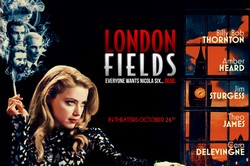In a given lifetime, a viewer has definitely seen a trailer for a film that just didn’t click with their interests.
It flew past their eyes and out of their heads.
There are other trailers that could have sparked a distinct reaction: ‘we have to see it!’ or ‘God, who made this?’
Movies have been fighting for public viewership since their inception. Some succeed dazzlingly, many movies coast along, and others nose-dive into an always-growing cinema graveyard.
But how does a movie ‘bomb?” What must happen for a film to fail so badly, that it has virtually no attendance and falls quickly from our collective memory?
This was the case for the neo-noir flick London Fields directed by Matthew Cullen, which was released on Oct. 26.
This film follows a “clairvoyant femme fatale” named Nicola Six, who predicts her own murder. Nicola begins love affairs with three oh-so-handsome men, despite knowing one of them will murder her.
Recently, this film snatched the title of one of the lowest box office grosses, with a production budget of about $8 million and a bombastic box office revenue of $249,686 over two weekends.
Knowing this, what happened to London Fields, and why did this seemingly inconspicuous movie burn so harshly?
Robert Scott, a specialist professor of communication with previous experience behind the camera in film, lent some ideas.
“Movies can fail financially as a result of numerous factors today,” Scott said, “a weak marketing campaign can impact ticket sales. Timing can be a factor. The type of release can also have an impact.”
Scott then added, “Meanwhile, critical response and word-of-mouth is more important today because of social media, online recommendations, and sites such as Rotten Tomatoes.”
The review is one of the most deciding factors of a film’s potential for financial and social fame.
The fact that London Fields has a zero percent rating on Rotten Tomatoes is a sign, boldly displaying a professional distaste for the movie.
There is also a 4.3/10 rating on IMDb and a 16 percent on Metacritic.
Many of the complaints listed were that the film is confusing to the viewer, tacky, and just plain uninspired. The trailers reflected these complaints, as they were edited and marketed in a way that left many commenters scratching their heads.
London Fields was also released amidst massive competition; Venom, A Star is Born, and the new Halloween were all dominating the box office last month.
Considering this, in an age of constant stimulation and other media options at our fingertips, it can be easy for the public to disregard purchasing a copy or tickets to see a certain movie.
We have seen it all already in some other form, or there is something better available.
Streaming services provide easy access to an extensive catalog of films and TV programming at any time, as well.
Why spend $13 on a movie you’re weary of going to when you can watch it and other films on Netflix for $11 a month?
Plotlines are also important to critical and public reception.
Stories that appealed to generations before us can seem foreign or uninteresting to media consumers today. Most of us don’t want to buy into bad cinematic experiences or those we do not care to see.
London Fields is a neo-noir, inspired by those dramatic, smoky, and dimly-lit detective stories of the 1930’s and 40’s.
Today’s generation may not have an overwhelming need for a new movie with antiquated values, in favor of having a desire for more colorful, inspiring, and evocative accounts (judging by recent cinema favorites).
Scott asserted a related point, “A film can fail if it does not tell a compelling story or prove to be entertaining. A number of things can go wrong with a film from script to screen. It is a collaborative art form with numerous contributors.”
Originally a book by Martin Amis, the change of medium for London Fields caused more setbacks, as actors needed to be hired to fill complicated roles and the budget skyrocketed into the millions.
London Fields went through multiple legal battles, including with lead actress Amber Heard, regarding more adult content for the movie that she would not shoot.
Disoriented audiences saw a few differently tweaked versions of the film, which was made to avoid more lawsuits.
It was not artistically-driven to have alternate scenes, but a necessary legal choice.
The failure of London Fields was only solidified by Amis himself. The writer stated that, amidst legal troubles and foggy plotline, he never anticipated that the film version would be well-received.
Essences of the defeat of London Fields can be seen in most, if not all, of box office failures today. In changing times with evolving moviegoer needs, many films get suffocated under shinier and more marketable movies.
Others are out-paced by content from other media platforms, especially social media.
What results are a loss of revenue, interest, and a guaranteed spot in that failed cinema graveyard.
PHOTO TAKEN from Zero Trailers




